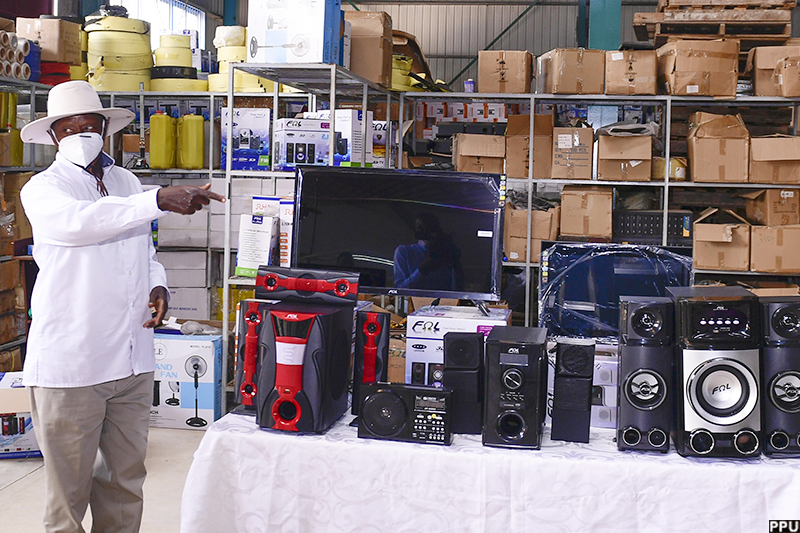Electronics dealers tasked on BUBU
Jul 22, 2023
"It is also a great contribution to our goal of building an integrated, self-sustaining economy," Bahati said.

President Yoweri Museveni launched the facility in 2020 and its target is to create at least 15,000 jobs over five years in the manufacturing sector.

John Masaba
Journalist @New Vision
Electronics commodity dealers in Uganda have been urged to look inward by buying more locally manufactured goods rather than focusing on only imported products.
Citing the availability of sufficient stocks of locally manufactured goods that are of high quality, David Bahati, the minister of State for Trade in charge of Industry, said buying more Ugandan-made products will not only help the country grow the capacity of the local industry but also promote more jobs for wealth creation.
He made the call as local electronics maker Uhome launched its Madien distribution store in Kampala. The store will act as its outlet for high-end electronics products, including television sets, phones, iPads, washing machines, and other related products.
Most of these products are made and assembled at the 619-acre Sino-Mbale industrial park.
President Yoweri Museveni launched the facility in 2020 and its target is to create at least 15,000 jobs over five years in the manufacturing sector.
L-R Azarwagye Simon Country Sales Manager Mione,Shirtey Chen President Mione Phones, Jesse Zhang Vice President Black Ark and Haier and Kavuma Eid Kolo Marketing Director Tian Tang Group during the launching of Ut Homes at Kampala on. (Photo by Ivan Kabuye)
Bahati hailed Uhome for reaching the milestone, adding that their efforts are complementary to the government's strategy of import substitution and export promotion.
Facilitating integrated economy
"It is also a great contribution to our goal of building an integrated, self-sustaining economy," he said.
He added: "As you are aware, the industrial sector contributes 26.5 percent of our GDP of $45b and adds 1.2 million jobs to our job stock. Therefore, without doubt, the industrialisation process in our country is unstoppable."
Uganda Investment Authority (UIA) chairman Morrison Rwakakamba said more locally-made products on the market mean the country will now be able to reduce its import bill and increase its export base.
"Remember all those products that are being produced in Mbale and other industrial parks? We used to import all of them, therefore hemorrhaging foreign exchange and also jobs," he said.
"Also, beyond the jobs these industrialists are giving Ugandans, they are also training them with high-end skills. If you go to Mbale, especially to the TV and phone factories at the industrial park, you will find young people assembling phones and putting together parts. These are transferable skills. It is evident that the vision of President Museveni and the NRM is working."
In line with the government's BUBU (Buy Uganda, Build Uganda) policy, Rwakakamba encouraged distributors, retailers, and wholesalers "to engage with these manufacturers and buy the products that are produced in Uganda because they are of high quality."
Shirty Chen, the president of MiOne, which runs the phone production line at the Sino-Mbale Industrial Park, thanked the government for the conducive investment environment.
Pro-private sector policies
Without pro-private sector policies championed by President Museveni, their efforts would not have yielded the current outcome, she said.
"I am excited that we are opening this new shop in Uganda,” she said.
She encouraged Ugandans to embrace their products, noting: “This business does not belong to China; it belongs to Ugandans."
Eid Kollo Kavuma, the Uhome head of marketing in Uganda, said due to the affordability of their gadgets, many education institutions can adopt them as tools for e-learning.
“Using our gadgets (such as iPads), learners in remote areas can access content as can the students in urban schools,” he said.
Jesse Zhang, the vice president of Black Ark and Haier Electronics, said that although their products are reasonably priced, they are of high quality.
He said that all products will have a warranty of 24 months and that they have been pretested for defects to ensure quality.
He said in addition to their store on Jinja Road, several other centers will be opened up in several parts of the country in the coming weeks to increase the availability of their products.
Growing influence
According to the UIA, the latest development is the testimony of Uganda's increased attraction to the world as a destination for foreign investment (FDI).
As of August last year, FDI from China alone had reached $131 million, ranking number 10 among all the African countries.
Some of China’s flagship projects in Uganda include the Wagagai Gold mining project, the Karuma hydropower dam, the Kingfisher development project and Osukuru Phosphates and Steel projects are being developed by companies from China.
Recently, Zhang Lizhong, the Chinese ambassador to Uganda, revealed last year that the developments reflect the great importance attached by the governments and entrepreneurs of the two countries to deepen bilateral economic cooperation.

No Comment